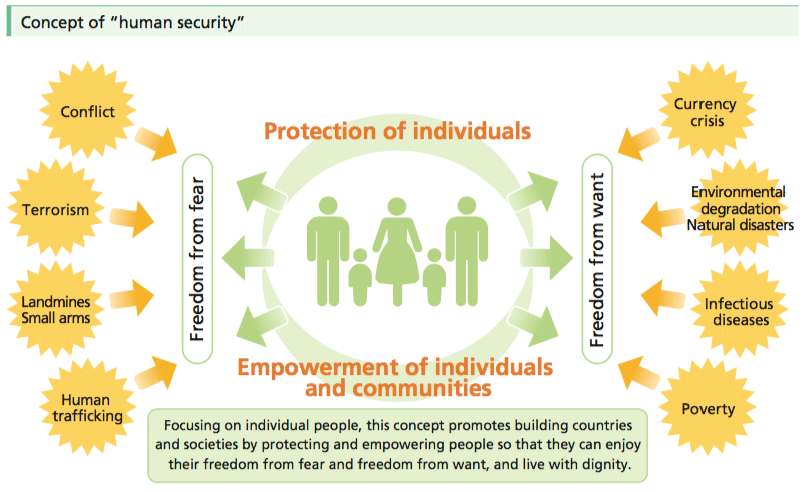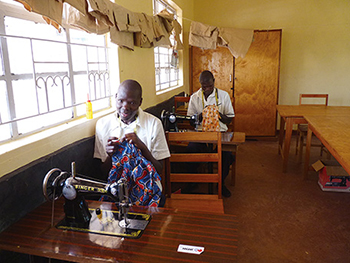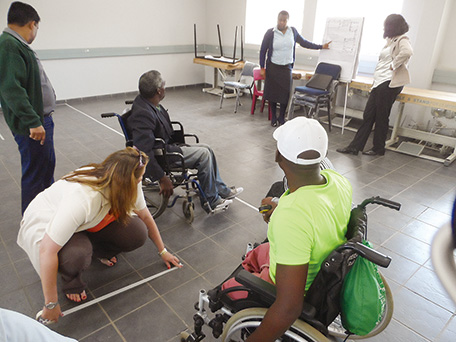(4) Disparity Reduction (Assistance for People Who Tend to Be in Vulnerable Situations)
Ongoing efforts are being made to implement the 2030 Agenda for Sustainable Development. Meanwhile, a number of issues in which it is difficult to identify where the problem is and address it properly at the broader national level is brought to light. “Increase of disparities” is one of them. Moreover, challenges such as poverty, conflict, infectious diseases, terrorism, and natural disasters have varying impacts depending on the situations that individuals are in, including women and children. To deal with this situation, it is effective and essential to adopt not only the existing nation-centered framework, but also a people-centered approach.
< Japan’s Efforts >
| Human Security
Japan places priority on the principle of “human security.” This concept, which focuses on each individual, seeks to build states and communities by protecting and empowering individuals so that they can live in dignity, free from fear and want.
To advance human security, the Japanese government undertakes a variety of efforts, both to (i) promote the concept and to (ii) put it into practice.
(i) For promoting the concept, Japan has played a leading role in establishing the Commission on Human Security, which is an international commission of experts, as well as convening the informal, open-ended forum Friends of Human Security to increase the number of countries on board with the concept. Based in part on the achievements of these efforts, the UN General Assembly unanimously adopted a resolution concerning a common understanding on human security in September 2012 under Japan’s leadership.
(ii) For putting the concept into practice, Japan spearheaded the launch of the UN Trust Fund for Human Security in 1999. Japan has thus far contributed approximately ¥43.6 billion in total, and supported 237 projects in 88 countries and regions contributing to the promotion of human security, implemented by relevant UN agencies (all figures as of the end of December 2015). In the new Development Cooperation Charter approved by the Cabinet in February 2015, human security is defined as the guiding principle that lies at the foundation of Japan’s development cooperation.

| Assistance for Persons with Disabilities

Boys with intellectual disabilities learn sewing at a vocational training school (St. Joseph the worker facility for children with intellectual disabilities and epilepsy) in the town of Kakamega in western Kenya. (Photo: Caroline Vigot / Embassy of Japan in Kenya)
It is important that capacity building and community development are promoted to ensure the social participation and inclusion of people in vulnerable situations in society, such as young people and women, especially persons with disabilities.
It is Japan’s policy to pay due attention to the socially vulnerable, including persons with disabilities, when planning and implementing ODA policies for development cooperation. Policies for persons with disabilities cover a number of different fields, including welfare, health and medical care, education, and employment. Japan has utilized the techniques and experiences Japan has accumulated in these fields through ODA and NGO activities to promote measures for persons with disabilities in developing countries. For example, Japan carefully tailors its assistance to various local needs, such as promoting barrier-free railroad infrastructure and airports, building vocational training and rehabilitation facilities for persons with disabilities, and providing minibuses for their transportation.
Additionally, through JICA, Japan provides a range of technical cooperation to enhance the capacity of organizations and personnel offering assistance to persons with disabilities in developing countries. Included among these efforts are the acceptance of trainees from developing countries and the dispatch of JOCVs and a variety of experts, including physical and occupational therapists and social workers.
In January 2014, Japan ratified the Convention on the Rights of Persons with Disabilities. The Convention establishes independent clauses setting out that states parties will undertake measures for international cooperation and its promotion (Article 32). Japan will continue to contribute to increasing the rights of persons with disabilities in developing countries through ODA and other means.
South Africa
Disability Mainstreaming Advisor
Technical Cooperation (December 2012 – Ongoing)

Design workshop (participation-type lecture) for mock restroom facilities designed for improved accessibility (Photo: JICA)
The Republic of South Africa is seeing inequality rise in terms of access to basic social services because of growing economic disparity. In particular, persons with disabilities have limited opportunities for education and employment. These people are considered the poorest of the poor and are excluded from the benefits of social development.
The Government of South Africa is promoting disability mainstreaming, which means ensuring equality for all people regardless of whether they have disabilities or not. To do so, South Africa is expanding services for persons with disabilities in accordance with the UN Convention on the Rights of Persons with Disabilities, which was ratified in 2007. However, the country faces a number of challenges, including a lack of information and capacity to implement policies in the field.
As a result, South Africa’s Department of Social Development (DSD) requested the assistance of the Government of Japan. Japan dispatched experts with knowledge and skills related to creating welfare programs for persons with disabilities. These experts then assisted the South African government in solving the issues it faced.
Currently, experts dispatched from Japan are working with the office within the DSD that is in charge of affairs related to persons with disabilities. They are holding joint capacity-building training sessions across the country for disability mainstreaming. In addition, they are also observing, monitoring and assessing activities aimed at disability mainstreaming in regions throughout South Africa.
Furthermore, these experts are also assisting DSD employees in building collaborative relationships with persons with disabilities and related organizations, as well as in establishing a network for sharing information with Swaziland and Lesotho, which are fellow members of the South African Development Community (SADC). Training sessions for DSD employees and persons with disabilities were held in all nine states, including the rural parts of South Africa. These sessions included discussions about how to create a barrier-free society, reasonable considerations for persons with disabilities, raising awareness about disabilities, and the formulation of mainstreaming action plans. Efforts are also being made to organize groups for persons with disabilities.
In addition, surveys on improving slopes and restrooms at public facilities for persons with disabilities through their onsite observations are being implemented, and specific plans for improvement are being discussed.
In this manner, Japan’s assistance is being used to promote disability mainstreaming and to improve the social standing of persons with disabilities in South Africa. (As of August 2015)
